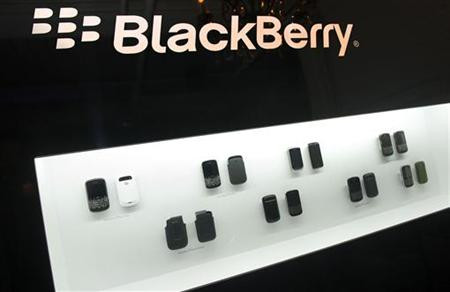BlackBerry's Business Model Turns Sour: More Than Just A Blackout

The three-day blackout earlier this month cast a dark shadow over RIM, but the BlackBerry manufacturer had been in trouble long before a server in Slough decided to take the day off.
As recent as May 2010 BlackBerry manufacturer Research in Motion (RIM) commanded more than 40 per cent of the US smartphone market, with Google's Android sitting at less than 15 per cent; Apple accounted for 25 per cent.
Just one year later, in May 2011, RIM's share of the US market had tumbled, from over 40 per cent to slightly below Apple at 25 per cent; during the same period Android had seen dramatic growth, climbing from below 15 per cent to almost 40 per cent.
In the aftermath of the London riots in August the BlackBerry Messenger (BBM) network was partly blamed, as it was believed that rioters were coordinating attacks over the messaging system. Calls were made for BBM - and all mobile phone networks - to be shut down during times of national crisis. BlackBerry was asked to hand over data logs of messages sent over BBM - the company declined.
But it was the data outage starting on October 10 that caused 'HMS BlackBerry' to crash into the rocks. Users lost their data connection to RIM's servers, meaning that internet and email could not be accessed, and BlackBerry Messenger could not be used.
Ironically, it was the very servers that offer BlackBerry's unique selling point - encryption on all messages and emails - that brought the service to tens of millions of customers the world over to its knees.
'BlackBerry' and 'BBM' both became worldwide trending topics on Twitter - and remained there for the three days the outage lasted. RIM claimed after the first day to have fixed the problem, but just a few hours later the service collapsed once more, leaving the network providers to pick up the pieces.
Vodafone Egypt told its Twitter followers: "there is Blackberry outage, it's from RIM side," and T-Mobile UK said: "There is an issue with Blackberry services at present. RIM are investigating this at present."
But Research in Motion did not issue an apology until the third day, when CEO Jim Balsillie expressed his regret in a video on the company's YouTube channel. The apology was sincere and heartfelt - for a CEO - but the damage had already been done.
Service was restored soon after the apology, but if RIM was hoping for a quiet month it was very much mistaken.
Following the blackout, news spread of several UK and US banks trailing the use of iPhones and iPads in the workplace. Until recently BlackBerry had dominated the business market, but the blackout clearly raised concerns about the company's reliability.
The PlayBook tablet - which has sold badly since it was launched in the summer - saw significant price cuts, first by PC World and Currys in the UK, then BestBuy in US, followed by even steeper cuts again in the UK. The initial retail price of £399 for the 16GB model has tumbled to around £215.
Last week RIM announced its new mobile operating system, BBX, which features an overhauled user interface called Cascades and cloud services. BBX appeared to be a solid software update, and follows in the footsteps of iOS and Android by being an OS that is tailored for both smartphone and tablet.
But just one day after the announcement, a little-known US company claimed it owned the BBX trademark, and it would be taking legal action against RIM if it continued to use the name. While no one is expecting RIM to change the name, being involved in a legal case on as-yet unreleased software is certainly an annoyance for the firm.
After the announcement it was revealed by RIM that a 2.0 software update to the PlayBook would be released but this has since been delayed until February and BlackBerry has confirmed that the update will not bring a dedicated BBM service to the tablet.
BBM can be used on the PlayBook, but only once the tablet is tethered over Bluetooth to a BlackBerry phone - and the same is true for contacts, calendars, email and 3G connectivity.
October also saw the announcement and subsequent release of Apple's iOS 5 and iPhone 4S, which saw a record four million units sold in its first weekend. The overdue release of the iPhone 4S, coupled with the data outage, saw gadget trade-in company Gazelle see a huge 80 per cent spike in BlackBerry trade-ins by customers who no longer wanted them.
As the month draws to a close yet more bad news surrounded BlackBerry, with the revelation that its senior vice president for software design, Jim Tobin, left the company several months ago. This year RIM has lost chief marketing officer Keither Pardy and head of developer relations Tyler Lessard, as well as Tobin
October has been the month that RIM would rather forget, and the company can only hope that its servers are fixed and new hardware and software impress consumers enough to keep them loyal to the brand.
© Copyright IBTimes 2025. All rights reserved.





















